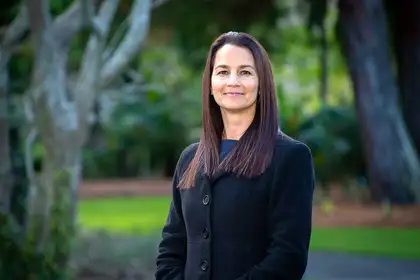
Dr Natasha Tassell-Matamua, School of Psychology, wants to find out about Māori views on the environment
How do Māori balance being modern-day consumers and traditional kaitiaki (guardians) of nature’s precious resources? A Massey University survey is asking Māori about their beliefs regarding the environment and how these translate into behaviour, in an era of climate crisis concerns.
Dr Natasha Tassell-Matamua, Te Ātiawa, Ngāti Makea kei Rarotonga, a senior lecturer in Massey’s School of Psychology, is leading the study, thought to be the first in New Zealand, to explore indigenous beliefs and behaviours about the environment within a psychological framework.
While respect and care for the environment is central to Te Ao Māori, as reflected in narratives, whakataukī (proverbs) and tikanga (cultural practices), the researchers are interested to find out to what extent traditional knowledge informs contemporary ideas and actions, especially among Māori living in urban settings.
“Our theory is that because Māori have – as a cultural group – this sense of connectedness to the wider environment that our actions will reflect that connectedness,” Dr Tassell-Matamua says.
“We’re looking at ideas, like kaitiaki [stewardship and guardianship of natural environment and resources], which are embedded in our research. Even though as a cultural group we have these idealistic views of our relationship with the environment, and that we are caretakers and guardians, as researchers we’re aware there are a lot of contemporary structural factors that inhibit people from behaving pro-environmentally.”
The survey comprises questions on Māori identity and environmental connectedness, including attitudes, views and behaviours to do with enjoying and caring about the environment, taking actions to protect it (from gardening to recycling), consumer choices regarding environmentally-friendly products, and spiritual beliefs about nature.
Respondents are also being asked about their opinions on the current state of the planet, so that researchers can gauge Māori views on climate change impacts, threats to natural resources and the soaring global population from a cultural perspective.
“People often talk about climate change, but we remove ourselves,” Dr Tassell-Matamua says. “We’re looking at human behaviour and what we need to do, or are doing, to mitigate some of the impacts of our behaviour. We want to to see if there is an alignment between attitude and behaviour. Often people will say ‘I’m pro-environmental and I’m doing my bit’ but this doesn’t always translate into action.”
Dr Tassell-Matamua is working with Dr April Bennett, Tūwharetoa, Waikato, Tūhoe, Ngāti Raukawa ki te Tonga, a lecturer in Māori resource and environmental planning from Massey’s School of People, Environment and Planning, and Dr Bridgette Masters-Awatere, Te Rarawa, Ngai Te Rangi, Tuwharetoa ki Kawerau, a community psychologist from University of Waikato.
The researchers are also interested in how the values, beliefs and behaviours of survey respondents fit with the complexities of socio-economic status, and they hope the data will be of use to environmental policy makers in iwi, local body and national government, as well as to educators at all levels.
The survey, funded through a Massey University Research Fund grant, came about through Dr Tassell-Matamua’s involvement in Ngā Pae o te Māramatanga’s Climate Change Platform, which brings together Māori-focused researchers across a range of disciplines with an interest in climate change.
“Climate change is a global issue and the reality is we need to make immediate and significant changes to the way we live, rather than continually predicting that the climate is going to change in certain ways, without seriously addressing how we can or might mitigate that,” she says.
Anyone aged 18 and over, and who identifies as Māori, is eligible to take part. For more information or to do the survey, click here: “Kia mau ki tō toko; titiro whakaute” Pro-environmental attitudes and behaviours among Māori.